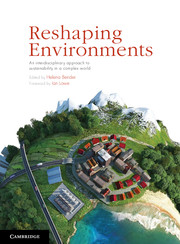Book contents
- Frontmatter
- Contents
- Contributors
- Acknowledgements
- Introduction Reshaping environments – an opportunity for envisioning the future
- Part 1 Cases
- Part 2 Skills
- Part 3 Theory
- 13 Conceptualising change
- 14 Sustainability
- 15 Human needs and norms
- 16 Conceptualising and thinking about environmental systems
- 17 Why scale matters
- Index
- Plate Section
- References
17 - Why scale matters
from Part 3 - Theory
Published online by Cambridge University Press: 05 February 2013
- Frontmatter
- Contents
- Contributors
- Acknowledgements
- Introduction Reshaping environments – an opportunity for envisioning the future
- Part 1 Cases
- Part 2 Skills
- Part 3 Theory
- 13 Conceptualising change
- 14 Sustainability
- 15 Human needs and norms
- 16 Conceptualising and thinking about environmental systems
- 17 Why scale matters
- Index
- Plate Section
- References
Summary
The importance of thinking about scale in the study of human–environment relations cannot be overstated; it is one of the central problems of ecology … and one of the most vexing concepts in social theory … (Sneddon et al. 2002, p. 665)
Scale remains poorly understood, carelessly applied and surprisingly chaotic.
(Howitt 2002, p. 299)Introduction
This chapter is about scale: what it is and how it matters. In particular, it is about why scale matters for studying, understanding and reshaping human–environment interactions in the pursuit of sustainability (see Chapter 14). This chapter encompasses ways of thinking about and using scale from a range of disciplines and subdisciplines such as human geography, environmental engineering, ecology, Earth sciences, physical geography, sociology and political science. It also attempts to move beyond disciplines into interdisciplinary ways of thinking about scale.
The two quotes above demonstrate that the concept of scale is an incredibly complex one. Indeed, after decades of trying to develop and clarify this concept, scale theorists (people who seek to make sense of scale and how we use it in scientific inquiry) have not yet been able to manage the task. As Sneddon et al. (2002) note in the first quote above, scale is one of the most important yet problematic concepts in ecology and social theory, and it is vital in any attempt to understand human–environment relations. According to Howitt (2002), scientific thinking about scale is far from being well-organised and defined.
Information
- Type
- Chapter
- Information
- Reshaping EnvironmentsAn Interdisciplinary Approach to Sustainability in a Complex World, pp. 368 - 391Publisher: Cambridge University PressPrint publication year: 2012
